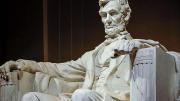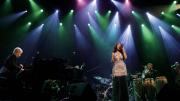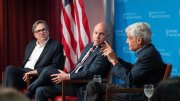Michael Ignatieff, Ph.D. ’76 and former professor at the Harvard Kennedy School, is a professor at, and former president and rector of, the Central European University, in Vienna. His latest book, On Consolation (Metropolitan Books, $26.99), began as a quest to understand why the Old Testament’s Psalms are so consoling and, then, what it means to be consoled. We “respond to their promise of hope,” he realized, “because the Psalms recognize what we need hope for”—to be reminded that “we are not marooned in the present” and can draw “inspiration from each other across a millennium.” One chapter is on Abraham Lincoln’s Second Inaugural Address, delivered not long before the Civil War’s end and, only days later, the president’s assassination. The speech “directed to history and to Providence” the question “why such a catastrophe had befallen North and South alike.” As Ignatieff explains, Lincoln concluded that “neither side could ever know what God intended by the fiery trial,” so “the victor had no right to raise the sword of vengeance while the defeated had the right to claim the dignity of honorable defeat. Humility about the ultimate meaning of the war, in other words, created the space for mercy.” The chapter ends:
Lincoln should be with us all these days especially since “malice toward none” has been replaced by malice toward all, as if in our ideological arrogance we have forgotten that neither God nor justice is necessarily on our side. It is often said…that the Civil War whose end he thought was in sight still continues. The freedom he thought was coming to Black Americans is still not securely in their hands. His work is not done, and the words of the second inaugural…are less a consolation than a reproach.
It is easier to remember Lincoln as a saint than to learn from him, but we cannot draw consolation from his words unless we commit to that learning. He struggled with exactly what we struggle with: the tidal force of political malice that recurrently rises and threatens the hard-won civility on which a democracy depends. What helped him…was the tenacity with which he forced the best traditions he had inherited—in this case the Gospels and the Psalms—to deliver insight and perspective. He did not have a secure footing in faith, but he understood that these biblical traditions called on him to forswear vengeance and judgment and to appeal for mercy and forgiveness. These traditions can speak through us too. What consolation can there be in this? That we are not condemned to lived imprisoned in the rhetoric, foolishness, and mendacity of the present. We can reach back to Lincoln, to Matthew, to the Psalms, to whatever wisdom we have ever been taught, and find out, once again, who we are, where we are, what we must accept, and what we must not. These traditions of ours risk becoming inconsequential and empty words…unless we use them, we force meaning from them, as Lincoln did, and unless we continue to live by them, as he tried to do.








